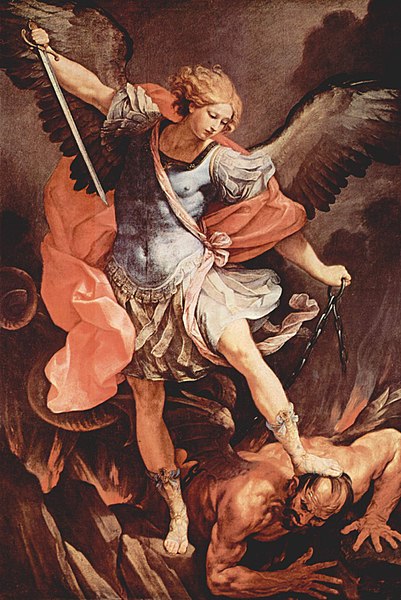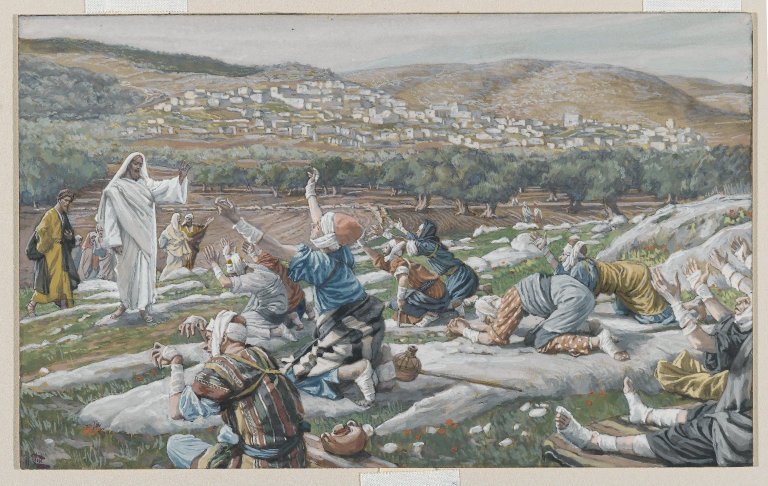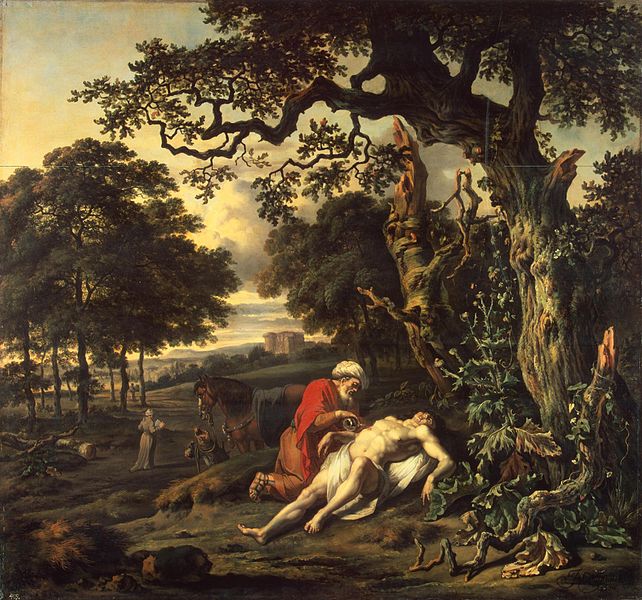September 29, 2019
I believe in one God, the Father Almighty, maker of heaven and earth, and of all things visible and invisible. We Christians believe that God created the invisible, those things which cannot be seen. I’m not talking about the air or microscopic organisms, which cannot be seen with the naked eye. I’m talking about things that cannot be seen by the human eye, things which can only be seen by faith. When we confess in the Nicene Creed that we believe that God is the maker of all things visible and invisible, we confess our belief in angels.
Angels are real. They are God’s servants. They do not have bodies; they are spirits. Yet, when they do reveal themselves to the sight of humans they are always depicted as mighty and powerful. And they are. Psalm 103 calls them “mighty ones.” They make up the mighty armies of God. And the Bible teaches us that God uses these angels, these mighty spirit-servants, to guard and protect us.
“I walk with angels all the way, They shield me and befriend me;
All Satan’s power is held at bay When heav’nly hosts attend me;
They are my sure defense, All fear and sorrow, hence!
Unharmed by foes, do what they may,
I walk with angels all the way.”
How true! “For he will command his angels concerning you to guard you in all your ways. On their hands they will bear you up, lest you strike your foot against a stone.” (Psalm 91:11-12) We tell our children that guardian angels watch over them. This isn’t a childhood story. Angels are real. They are mighty. They do God’s will. They see the face of our Father in heaven. And they guard us day and night.
Angels fascinate people, probably because they are so mysterious. We can’t see them. And when they show up in Scripture it is usually for a very short period of time, and our questions about them are rarely answered. Angels are not as popular media portray them, beautiful and elegant ladies or chubby bare-bummed babies. Again, angels are spirits and do not have bodies, but when they take on a visible form, they are always powerful beings, often with flaming swords and chariots. Angels guarded the way to the tree of life after Adam and Eve were expelled from Eden. Angels fought and conquered Israel’s enemies, closed the mouths of lions, and protected the holy family in their flight to Egypt.
We are not being superstitious when we say angels kept someone safe when their car crashed or guided them through a painful cancer treatment. Yet, we must remember that our greatest danger is not physical, but spiritual. As there are faithful angels who do God’s will, so are their evil angels. Satan was once an angel of God, but he rebelled. And all the demons are fallen angels, who fought against Michael and his angels. Our enemies are not of flesh and blood, but they are the rulers, the authorities, the cosmic powers over this present darkness, the spiritual forces of evil in the heavenly places, these are the enemies we must wrestle and fight.
Such battles sound exciting. Many an adventure-hungry young boy longs to see the battle of angels in the sky with the dragon being slain. How we would love to strap on our armor and bear our sword. We’re eager to fight Satan; to mock his demons; to stand side by side with the angelic hosts and strive for victory! Oh, how confident we are that we’d stand with the good angels and fight against the bad!
Yet, we don’t see the angels, good or bad. Satan doesn’t appear as a red dragon with sulfuric breath and evil eyes. He’s much more subtle. Our battle against Satan and his hordes does not take place in the sky and we don’t get to brandish fiery swords. Rather, we must battle our own temptations and unbelief here in the visible world. We’re attacked by Satan when we let our anger rise up and take control of our senses. When we choose division and discord over peace and reconciliation. Satan attacks when lust rises in our hearts, when our eyes look on those things that should not be seen and when our mouths speak words that should not be said. Satan gains ground in his warfare when he persuades us to ignore God’s Word for days, weeks, and months at a time, to treat it as an afterthought with no place of influence in our lives. Satan advances when your pride convinces you that you are better than others and more worthy of the title of Christian. Satan gains ground when he plants doubt in your mind, which makes you disbelieve God’s word and doubt his promises. Satan’s greatest achievement is the conquest of your invisible soul.
We can’t see Satan and his demonic hordes at work, but that does not mean they are not there. They’re real. And they work in real life. It doesn’t look exciting. In fact, it’s often boring. Yet, it is destructive. Woe to you, O earth and sea, for the devil has come down to you in great wrath, because he knows that his time is short!
So, who are they who will conquer these dark angels? Who will stand side by side Michael and his angels, dressed in the armor of God, victorious on the battle field? Who are the greatest in the kingdom of God, who can stand such insidious warfare, which turns the world and even your own flesh against you? Can you picture in your head, who they are? These saints? What does Jesus say? … A little child. A humble weakling.
“Unless you turn and become like children, you will never enter the kingdom of heaven. Whoever humbles himself like this child is the greatest in the kingdom of heaven.” These are the words of our Lord Jesus, who crushed the head of Satan. The humble will be exalted. The meek are the greatest. To be humble like a child means to receive from God by grace. Children don’t earn their pay. They receive all they have freely. They don’t deserve it. And so, each of us, if we want to be great, if we want to stand victorious over Satan, must humble ourselves and receive from God by pure grace.
What is it that we humble children receive from God that makes us great? It is the blood of the Lamb Christ Jesus. Jesus Christ himself has conquered Satan. Satan accuses us of sin before God, and Jesus shuts him up by blotting our sins out with his own blood. Satan bruised Jesus’ heal when our Lord was crucified, but Christ crushed his head when he paid for our sins and for this reason, God has raised him from the dead and seated him above all things on his heavenly throne. It is the humble children who are the greatest, because they receive as a gift the greatest, most powerful weapon imaginable. Through faith in the forgiving blood of Christ, you have the power to thrust Satan down from heaven.
It is not those who overcome temptation every time, who conquer Satan. It is not those, who can boast that they have never sinned or that they have withstood Satan consistently, who can claim victory on the battlefield. The righteous fall seven times, but rise up again. It is those who in humility repent of their sins to God and claim nothing of themselves, but only the shed blood of Jesus, which washes away their sins.
At Jesus’ darkest hour in the garden as he was betrayed and arrested by the thugs of the chief priest, he refused to request twelve legions of angels to come to his aid, because Jesus knew that all the myriad of the heavenly hosts could not rescue us from sin, death, and eternal damnation. Only his precious blood shed in the atoning sacrifice could take away our sins, undo death’s grip, and raise us to heaven. Only Jesus’ blood can conquer Satan forever and give us victory.
When you were baptized, Satan was cast down from heaven and his accusations against you were silenced. Every time you receive Jesus’ blood in humble faith, Satan is cast down from heaven at your feet and silenced. Your greatest weapon is not all the heavenly armies, but the precious, inexhaustible, unconquerable blood of Jesus Christ, the Lamb of God, who takes away the sin of the world.
God grants us, his humble children, the service of angels to guard and protect us both from physical danger and from the assaults of the devil and his minions. They guard us in all our ways, as we cling to the cross of Christ and the truth of his words. Angels do not work independently of Christ Jesus. And they do not help us overcome our foes apart from the blood of Christ. The word angel means messenger. The greatest work angels did was when they announced the birth, resurrection, and ascension and return of Jesus Christ. They announced the Gospel. And through faith in the Gospel, we possess the blood of Christ and have victory over Satan.
“See that you do not despise one of these little ones. For I tell you that in heaven their angels always see the face of my Father who is in heaven.”, says our Lord. Our angels serve us on behalf of Christ, for we are washed clean in his blood. When they see our Father's face, they see that he is pleased with us on behalf of Christ's blood. Let us not despise our fellow Christians, who are victorious by the blood of Christ, whose Father looks down upon with pleasure, and whom God has sent his angels to protect. Rather, let us love one another and pray for each other. And so, we will fight with the angels against Satan. And with the blood of the Lamb, we will win.
Let us pray.
Saturday night: I thank you, my heavenly Father, through Jesus Christ, your dear Son, that you have graciously kept me this day; and I pray that you would forgive me all my sins where I have done wrong, and graciously keep me this night. For into Your hands I commend myself, my body and soul, and all things. Let your holy angel be with me, that the evil foe may have no power over me. Amen.
Sunday morning: I thank you, my heavenly Father, through Jesus Christ, your dear Son, that you have kept me this night from all harm and danger; and I pray that you would keep me this day also from sin and every evil, that all my doings in life may please you. For into your hands I commend myself, my body and soul, and all things. Let your holy angel be with me, that the evil foe may have no power over me. Amen.




 RSS Feed
RSS Feed